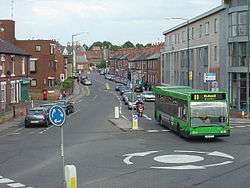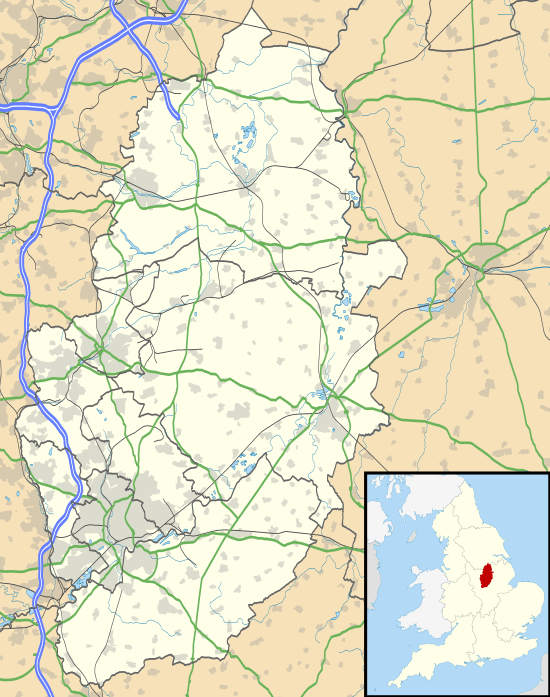Basford, Nottingham
Basford /ˈbeɪsfərd/[1] is a northern suburb of Nottingham, England, incorporated into the city in 1877. It gave its name to Basford Rural District, which existed from 1894 to 1974. The population of the ward at the 2011 census was 16,207.[2] Next to Old Basford is New Basford, which is mainly Victorian. Basford lies close to the River Leen, a tributary of the River Trent. It is linked to Nottingham City Centre to the south and Hucknall and Bulwell to the north by the Nottingham Express Transit tram service.
| Basford | |
|---|---|
 Nottingham Road, Basford | |
 Basford Location within Nottinghamshire | |
| Population | 16,207 (ward. 2011) |
| OS grid reference | SK 55791 42652 |
| Unitary authority | |
| Ceremonial county | |
| Region | |
| Country | England |
| Sovereign state | United Kingdom |
| Post town | NOTTINGHAM |
| Postcode district | NG6 / NG7 |
| Dialling code | 0115 |
| Police | Nottinghamshire |
| Fire | Nottinghamshire |
| Ambulance | East Midlands |
| UK Parliament | |
Toponomy
The name appears as Baseford in the Domesday survey of 1086;[3] Basford contains the Old English personal name Basa, + ford (Old English), 'a ford', so 'Basa's ford'.[4]
History
Close to Basford Register Office is the site of a former workhouse. This was used for Basford and for neighbouring parishes. The workhouse later became a maternity hospital and then a psychiatric hospital.
Near Vernon Park there used to be a complex of high-rise flats which consisted of horizontal and vertical blocks connected by aerial concrete walkways. These were demolished in 1983.
Basford has a range of shops in its extensive area. Home to Vernon Park, Basford also has football teams who play there. There is a Bulwell and Basford Rotary Club.[5]
For many years one of the largest industries in Basford was soap manufacturing – a factory was established in the 1890s by Gerard Bros., which in 1955 was acquired by Cussons Sons & Co, manufacturer of Cussons Imperial Leather soap. In 2005 the factory was closed and production moved to Thailand.
Basford was well served by railways, with three stations bearing its name in one form or another. Basford Vernon was the earliest, on the Midland Railway's Nottingham to Mansfield Line. The next to be built was Basford North on the Great Northern Railway, which was originally called Dob Park from the land it was built on, then later Basford & Bulwell. Finally came New Basford on the Great Central Main Line. Basford North and New Basford closed along with the lines on which they were situated. Basford Vernon closed in 1964 but the line on which it stood remained open for freight and was subsequently reopened to passengers as the Robin Hood Line. The station itself did not reopen, but it is now the site of Basford tram stop on the Nottingham Express Transit.
The headquarters of the Nottinghamshire Miners' Association were in Basford for many years.[6]
Basford had three breweries, of which Shipstones is most widely known. The other two were Basford Brewery (taken over via Shipstones) and the Prince of Wales Brewery in Old Basford, which is long closed, although its buildings remain much as built, now serving as Murphy's Chemical Works in Alpine Street.
Demography
According to the 2011 census, Basford has a population of 17,277. The average household size is 2.20 people and the population density 42.80 people per hectare.
Basford is a multi-cultural area. Old Basford is predominantly white but New Basford is more diverse. Overall, according to the 2011 census, it has 70.1 per cent of White British and 29.9 per cent of other ethnicities, including 11.5 per cent Caribbean, 3.3 per cent Indian, 2.7 per cent Pakistani and 3.3 per cent other European. According to the survey, Basford includes people from 51 countries outside the UK.
The suburb includes a number of Sikh gurdwaras, Muslim mosques, Hindu, Taoist, Confucianist and Buddhist temples, Jewish synagogues, and churches of Asian, African, Arab, European, Caribbean and South American origin.[7] The main Christian denominations have St Aidan's Church (Church of England), St Leodegarius Church (Church of England) and Basford Road Baptist Church. The nearest Roman Catholic church is Our Lady Of Perpetual Succour in Brooklyn Road, Bulwell.[8] The Nottingham Basford congregation of Jehovah's Witnesses also has a hall.
Education
Children in the Basford area usually attend Southwark Primary and Infants School, Heathfield Primary School, or Old Basford School. The only senior school in the area is the Ellis Guilford School and Sports College, located in Bar Lane. This has been refurbished with a new school building, new changing rooms, new sports hall, tennis courts, and football pitches.
Transport
Trams
Basford is served by several stops of the Nottingham Express Transit system:[9][10]
Buses
Basford is served by Bus Nos 68, 69, 70 and 71 on the NCT Yellow Line.[11]
- Basford (lines 1 and 2)
- Cinderhill (line 2)
- David Lane (lines 1 and 2)
- Highbury Vale (lines 1 and 2)
- Wilkinson Street (lines 1 and 2)
Business parks
Basford has three business parks: Rani Drive, Bar Lane and Park Lane.
References
- G.M. Miller, BBC Pronouncing Dictionary of British Names (Oxford UP, 1971), p. 11.
- "City of Nottingham Ward population 2011". Neighbourhood Statistics. Office for National Statistics. Retrieved 18 April 2016.
- J. Morris, (ed.) Domesday Book: Nottinghamshire (Chichester, 1977), 10:22 inter alia
- J. Gover, A. Mawer and F. M. Stenton (eds.), Place Names of Nottinghamshire (Cambridge, 1940), p. 138; A. D. Mills, Dictionary of English Place-Names (Oxford, 2002), p. 27; E. Ekwall, Concise Oxford Dictionary of English Place-names (Oxford, 1960), p. 29
- "Club Homepage". Rotary1220.org. 8 March 2015. Archived from the original on 10 February 2012. Retrieved 8 November 2015.
- Alan R. Griffin, The Miners of Nottinghamshire, vol. I, p. 180.
- "Basford – UK Census Data 2011". Ukcensusdata.com. Retrieved 8 November 2015.
- Catholic churches. Retrieved 17 September 2019.
- "Extending your Tram Service" (PDF). Nottingham Express Transit. Retrieved 5 August 2015.
- Election Maps (Map). Ordnance Survey. Retrieved 11 August 2015. Viewed for appropriate area with unitary authority ward boundaries and names selected.
- 69 bus service. Retrieved 17 September 2019.